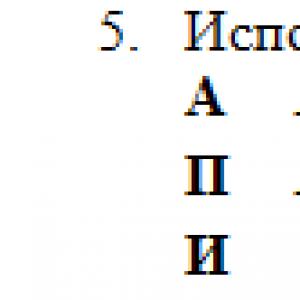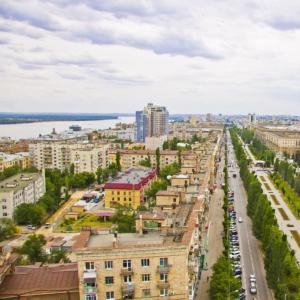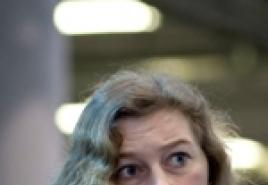May in absentia. Moscow Aviation Institute (national research university) (MAI)
Moscow aviation institute(national research university) traces its history back to March 20, 1930. In order to ensure the training of highly qualified personnel for the country's aviation industry on the basis of the Aeromechanical Faculty of the Moscow Higher Technical University named after. N. E. Bauman created the Higher Aeromechanical School (VAMU). On August 20 of the same year, it was renamed the Moscow Aviation Institute (MAI).
In March 2015, by Order of the Ministry of Education and Science Russian Federation The Moscow Aviation Institute was reorganized through the merger of MATI - the Russian State University of Technology named after K.E. Tsiolkovsky.
| Foundation of a higher aeromechanical school on the basis of the Moscow Higher Technical School named after. Bauman. Renaming to MAI. Training of specialists for aviation science and industry has begun | ||
| For exceptional achievements and particularly outstanding services during the Great Patriotic War Patriotic War awarded the Order of Lenin | ||
| Training of specialists in the field of rocketry, astronautics and weapons systems has begun | ||
| For his contribution to the development of the Soviet state, special courage and courage, and strengthening of peace, he was awarded the Order of the Great October Revolution | ||
| MAI received the status of “state technical university» | ||
| MAI received the status of “national research university” | ||
 |
||
| Merger with MATI |
MAI's mission is to train the world's elite personnel for the digital economy through advanced research at all stages of the life cycle of high-tech equipment.
With the participation of MAI and its graduates,

Cooperation with organizations
Total contracts
Membership in organizations
- International Astronautical Federation - International Federation of Astronautics
- International Council on Aeronautical Sciences (ICAS) - International Council on Aeronautical Sciences
- PEGASUS - European Association of Aerospace Universities
- Association "League for Assistance to Defense Enterprises"
- Association "Assistance to Universities"
- Association of Leading Universities of Russia
- Association engineering education Russia
- Association of Moscow Universities
- Association of Russian Cosmonautics Museums
- Association of Technical Universities of Russia
- Association of Technical Universities of Russia and China
- Association of Moscow Universities Employment Centers
- Eurasian partnership of aerospace clusters
- Innovation and educational cluster of aerospace technologies based on MAI
- Consortium "Robotic cluster of small-sized spacecraft»
- Consortium of Russian universities "National United Aerospace University"
- Space Scientific and Educational Consortium
- Russian Union of Rectors
- Council of University Rectors of the Northern Administrative District
- Union of Mechanical Engineers of Russia
- Russian Cosmonautics Federation
The uniqueness of MAI lies in the fact that it was historically created for the purpose of training designers and planners for almost all departments and teams of design bureaus and aviation industry plants (from the design of wing, fuselage, landing gear, and propulsion systems to technology and economics of production). At the request of enterprises of the military-industrial complex, the MAI began and developed the training of specialists in all areas more than 50 years ago. life cycle products in the field of rocketry, astronautics, as well as in the field of weapons systems and precision weapons, support programs aerospace complexes. Subsequently, a number of other universities were created with the participation of MAI. In 2009, MAI won the competitive selection of university development programs and is currently one of 29 universities that the Government of the Russian Federation has assigned the category of “national research university” (Decree of the Government of the Russian Federation dated November 2, 2009 No. 1613-r).
The accumulated scientific-pedagogical, educational and scientific-methodological experience, the presence of a unique technological base, extensive connections with aerospace industry enterprises allow MAI to train highly qualified specialists whose level of training, knowledge, skills and abilities correspond modern requirements domestic and global labor markets. Such specialists are in great demand today by enterprises in the aerospace and defense industries of our country.
Graduates
Total graduates
165 000+
| General and chief designers, heads of organizations in specialized industries | 250+ |
| Academicians and corresponding members of the USSR Academy of Sciences and the Russian Academy of Sciences | 60+ |
| Honored Test Pilots, Heroes of the USSR and Russia | 150+ |
| Pilot-cosmonauts | 23 |
| Generals and senior officers | 2350 |
| Reserve officers | 60 000+ |
| Rectors of higher educational institutions | 16 |
| Honored statesmen and heads of economic structures, ambassadors, representatives of the business elite | 300+ |
| Olympic champions, world and European champions in various sports | 60 |
Over the years since its founding, more than 165 thousand specialists for aviation, rocket and space science and industry have graduated from the walls of MAI, to which we can add 60 thousand graduates of MATI, which was merged in 2015.
It is also worth noting that MAI is the leader among civilian universities in the number of graduates who became cosmonauts and test pilots.
Thus, among MAI graduates there are 23 pilot-cosmonauts who have worked in space for a total of more than 15 years. 14 of them performed 65 spacewalks. Many cosmonaut graduates are currently working in the cosmonaut corps.
MAI constantly monitors the career achievements of its graduates, including 29 general directors, 9 general designers, 38 chief designers, 4 directors, 97 other senior managers of specialized enterprises.
Today, university graduates form the backbone of the enterprises of the Ministry of Industry and Trade of Russia, the Roscosmos State Corporation, the Rostec State Corporation, UAC JSC, Tactical Corporation JSC missile weapons", JSC "Concern VKO "Almaz-Antey".
Most of the samples of modern (in service and (or) in operation) aviation and rocket and space technology were created under the leadership and with the direct participation of MAI graduates. As noted by Academician of the Russian Academy of Sciences E.A. Fedosov, “there is no need to say in the creation of which aircraft and rockets launched during the life of the MAI, its graduates took a certain part - in all of them.”
I am the mother of a third year student. My son is studying to become a programmer. It’s very difficult to study, three skins are torn off. Especially in the first year, especially Vestyak!) But those who really want to learn, and didn’t just come for a crust, are always afloat. For three years, according to my son, either those who obviously failed and transferred to another university in an easier way were expelled, or those who “forgotten” to study at all, did not appear at lectures, did not pass laboratory tests, tests and exams.
My eldest son completed his studies at the 1st faculty this year and entered graduate school without exams. When I defended my thesis, the audience applauded. I can say that studying is difficult, you won’t succeed, the granite of science needs to be chewed. Teachers of a high level and old school, they forge today's highly qualified personnel. Of the 27 people who entered the department with my son, only three reached the finish line. But these are specialists of the highest level. Employers are ready to hire them on any terms. 02.07 and my youngest son also submitted documents to the MAI. I agree about the admissions committee - it’s a complete mess, it’s surprising that for so many years the people who are involved in organizing the admission of applicants haven’t bothered to monitor other universities (what about them?) or at least transfer admissions committee in the cultural center where there are chairs. The biggest inconvenience is that you can’t select faculties by priority in one place; you had to go through this hell twice.
The first time will be difficult. The most common question in my head will be “why do I need it?” It will primarily concern outline, engineering, and chemistry. You will have to come to terms with what is needed and, gritting your teeth, pass the learning, cramming, subjects. Should I buy drawings? In my opinion, only in as a last resort. Believe me, a person who is not suited for drawing in any way - any drawing can be submitted by boring the teacher with your diligence and constant correction of the mistakes indicated by the teacher (I never got into the paid drawings), but the purchased drawings are scorched immediately and there is a risk of being sent with them . After the first failures at a session, you may have a strong desire to leave somewhere where it is easier. Even failing to pass the exam in three attempts and going to paid courses is not at all a reason to fulfill this desire, especially if there is only one tail. These are roughly the difficulties, future freshmen.
MAI is right next to me. I taught at a nearby school, many students went to MAI, mostly C grade students. In my opinion, everyone who wanted to did so did it. Information from 7 years ago. There is only one strong faculty left there, programming. Our school used to have grades 9-11, taught by teachers from the Moscow Aviation Institute. About 15 years ago they were in great demand, there was a competition for them. 7 years ago they took everyone there indiscriminately, now they can’t recruit one subgroup in the class. I think that MAI can be considered as a backup option. She graduated from MSU VMK herself, and her son graduated three years ago (budget). It’s difficult to study and they don’t take any bribes, they take three skins. My son's diploma course has less than half of the course left, and paying students are kicked out without hesitation; my son's classmate (paying student) flew out of the 2nd year and landed at the Moscow Aviation Institute, and completed it without much trouble. But in general, I’m not very happy, as they teach at the VMK now, the specialists from Baumansky are much stronger.
Hello, periodically looking through the posts, I noticed that there are very few leaks about MAI. Well, here's my review of MAI. I skipped 11th grade, to put it mildly, and therefore I didn’t pass the Unified State Exam; I took 5 subjects: Russian, mathematics, English, social studies, and took geography as a spare. I didn’t have a specific goal for admission, I thought something related to economics, but I didn’t even plan on geography. It turned out that it was geography that came out strong, for which there was almost no preparation. Fate turned out that I entered the Moscow Aviation Institute. A logical question arises, what can be done there with geography, and so, there is a specialty “environmental safety of space activities”; I went there because of the romantic name, without really imagining what I would study.
A little about the curriculum The first year was very difficult for all my classmates, since we are all practically humanities specialists, and in the first semester our syllabus I was overwhelmed with mathematics, physics, descriptive geometry, and so on; there was only one subject in my specialty. We took the session with the thought that after the 1st year there would be no more physics and mathematics. It was very hard when you hate these items with all your heart. In the second semester, history repeated itself, but more specialized subjects also appeared, now I am a second-year student, I have difur, engineering, materials science, twims, it seems like the last semester of torment, but we have already gotten used to it, in general, although we tirelessly repeat: " We're environmentalists" Educational process Attending is not the most difficult thing in this institute; there are subjects that definitely need to be attended (engineering graphics, English language), there are some that you don’t need, it’s different, I don’t have the best attendance, but then I have to pay for it at the end of the semester. The schedule is issued at the beginning of the semester and does not change anymore, unless you personally agree with the teacher. There are a maximum of 4 pairs per day, that is, you finish at 16 pm. Saturdays are different for everyone; we didn’t study before, but now we study once every two weeks.
The buildings and dormitories of the Corps are fortunately all in one place, but their condition is terrible, the elevators only work at times, the toilets are holes in the floor, and this is in the main building, there are no places where you can sit between couples, but we have no wardrobe, I think this a plus, since there are no eternal queues, and you can sit calmly in the audience in a jacket and a hat, I remind you that the buildings are terrible, the windows sometimes have huge cracks. I don’t live in a dormitory, but I’ve been in them, there are block and corridor types, it all depends on the faculty, but the dormitory of my faculty with the loud name “space” is in a deplorable state.
The entertainment program is run by the trade union bureau, and here it depends on everyone, but there is always the opportunity to go to the theater for free, to museums, etc. A lot has already happened, but I can’t say nothing about the May spirit, MAI has its own traditions, for example, when the entire institute he drinks on September 1st on the box, and then the police disperse everyone together, in general our institute is called a music and alcohol institute, but if you don’t drink, then no one forces you. There are a lot of chants about Mayevites, and probably the Mayevsky spirit is what makes him love him, despite all his disadvantages. MAI IS ME, MAI IS US, MAI IS THE BEST PEOPLE OF THE COUNTRY.
MAI is certainly the main institute in aviation. But it wouldn’t hurt to do some minor repairs in the dormitory, otherwise when we study, everything really matches high level. And when we come to the hostel, then, excuse me, it doesn’t correspond at all... Yes, of course the Muscovites and Muscovites don’t give a damn about this, of course, Tony went home and ate his mother’s borscht. But Moscow is not all of Russia, holy Russia is us, people from all over the country. And all these Muscovites are just nose to the top, but they are of no use. They don’t know a lot, and they’re very stupid, I’ve even started to notice that if they’re stupid, they’re one hundred percent Muscovite. Although I’m not against all Muscovites, don’t get me wrong, but the ones I’ve met are darkness and horror...
completed the first course at ENGINEERING MAI
Regarding the admissions committee, when I got in, I was also wildly horrified by everything that was happening, I even thought about giving up the idea of going there, but no, I did anyway) such a mess is always going on there and in my opinion they are not going to change anything, the main thing is don’t judge it the whole institute!
As for the renovation - at first, of course, the situation is striking, but then you get used to it) and in the ENZHEKIN building itself there was recently a renovation, everything there is very good + they have now built a new building, I don’t really remember for which faculty
The education itself is at a good level, not bad, but not excellent either, you understand, you’re not going to Moscow State University. the teachers really teach, in most cases they won’t just give you a grade for having beautiful eyes) during the year I remember the teachers on law, history (which I didn’t like, but I went to this teacher’s lectures with pleasure), matan (it’s generally difficult to forget), economics, computer science, statistics, etc. All of the above are very worthy teachers!
BUT! I would like to say separately about the dean’s office and everything connected with it - it’s just hell! horror! nightmare! the people working there are simply non-humans, I can’t say it any other way. that in the dean’s office there are girls from whom you will never get anything, they are always angry, and so on, I don’t understand why they took this job if they don’t like it, that the worst nightmare is the deputy. dean - I don’t even know who let her work with people, especially with students! constantly yells at everyone, in the literal sense of the word, I have never seen her without her yelling at someone, if you need to get something from her, you yourself understand what awaits you. All that remains is to limit yourself as much as possible from this person, but when you have to collide, in any case there will be an unpleasant aftertaste after communication. it feels like she’s either sick in the head, or it’s time to heal her nerves, or she just likes to take out all her anger on students
but the institute is good) I have never regretted that I entered here, and the atmosphere is good (well, almost) and the teaching!
- (MADI) ... Wikipedia
The rapid development of aviation science and technology that began at the beginning of the 20th century required fundamentally new engineering personnel for new branches of science and technology. In 1925, at the mechanical faculty of the Moscow Higher technical school(MVTU)… … Encyclopedia of Newsmakers
The "MAI" request is redirected here. See also other meanings. Moscow Aviation Institute (State Technical University) (MAI) International name Moscow Aviation Institute (MAI) ... Wikipedia
The "MAI" request is redirected here; see also other meanings. Moscow Aviation Institute (National Research University) (MAI) ... Wikipedia
- (MSTU GA) ... Wikipedia
Moscow State Technical University named after. N.E. Bauman- Officially, the date of foundation of the Moscow State Technical University (MSTU) named after N.E. Bauman is considered to be July 1, 1830, when Emperor Nicholas I presented to him the draft Regulations on the Moscow Craft Educational Institution... ... Encyclopedia of Newsmakers
Moscow State Technical University named after Bauman- Beginning of MSTU named after. N.E. Bauman as an independent educational institution was established on October 5, 1826, when the Dowager Empress Maria Feodorovna issued a decree on the establishment of large... ... Encyclopedia of Newsmakers
language mai.ru/priem
mail_outline[email protected]
schedule Operating mode:
Mon., Tue., Wed., Thu., Fri. from 10:00 to 17:00
Sat. from 10:00 to 14:00
Latest MAI reviews
Kirill Laptev 11:32 07/11/2013I entered MAI in 2009.
In our specialty “systems engineering” there were two groups, a total of 35 people. I failed the first session, losing my scholarship, but then everything went as it should, and I never made such a terrible mistake again. The teachers are mostly young, 30-40 years old. Regarding their attitude towards students - mostly positive (if the students treat them well), but there were a couple of rare freaks for whom no one could pass the laboratory and constantly...
Denis Nikopolsky 17:12 07/08/2013
It was interesting to go to college. Lots of new experiences, new relationships. I graduated from school with a physics and mathematics specialization. Therefore, the process and content of the entrance exams did not pose any particular difficulties. But this does not mean that everything was simple. The competition was four people per place; it was higher only at Moscow State University (5). And, of course, excitement, not knowing what’s next.
This was the heyday of the Soviet era. And, engineers, designers (aviation and space) are the most respected specialists. ...
MAI Gallery



General information
Federal state budget educational institution higher education "Moscow Aviation Institute (National Research University)"
University Reviews
The best financial universities in Russia according to the magazine "FINANCE". The rating is based on data on the education of financial directors of large enterprises.
TOP-10 largest universities in Moscow by number of students from performance monitoring educational organizations higher education of the Ministry of Education and Science in 2016.
About MAI
The Moscow Aviation Institute was founded back in 1930. Its goal was to train the most highly qualified specialists who could work in the Russian aviation industry. In 2009, MAI became the winner among 12 universities of the Russian Federation that participated in the competition for university development programs and, by order of the Russian government, it was awarded the honorary category “National Research University.”
Education at MAI
At the moment, at MAI you can get a higher education as a designer and designer of the widest profile for enterprises in the rocket, space, defense and aviation industries. Enterprises in the aerospace and defense industries are now in dire need of highly qualified specialists, so MAI graduates will always be in demand and can count on a successful career.
Now at MAI and its four branches - "Vzlyot" in the city of Akhtubinsk, Astrakhan region, "Rocket and space technology" in the city of Khimki, Moscow region, "Strela" in the city of Zhukovsky, Moscow region and "Voskhod" in the city of Baikonur, Republic of Kazakhstan - students are studying about 20,000 students in various forms of education.
At the institute you can get education in 33 areas of bachelor's training, 12 master's areas and 9 specialties that are in demand in the modern labor market. In addition, at MAI you can receive postgraduate education in 50 specialties in order to broaden your horizons and keep abreast of the latest technical developments in the field of aviation and the defense industry.
MAI also offers the opportunity to obtain a second higher education. Students can receive a second education either after graduation or simultaneously with their first education. Thus, upon graduation from MAI, students receive two diplomas at a time, which significantly increases their competitiveness in the labor market.
MAI graduates
Since the founding of the institute, since higher education MAI has graduated about 160 thousand specialists for both the rocketry and aviation industries. Among the graduates of the institute:
- 250 chief and general designers, as well as several heads of research programs and design organizations in the field of aviation;
- 50 academicians and corresponding members Russian Academy sciences;
- 21 pilot-cosmonauts, each of whom visited outer space;
- Elena Serova, a graduate of the Moscow Aviation Institute, was included in the crew of the International space station, which is scheduled to depart in the second half of 2014;
- 100 pilots who test aircraft equipment;
- many Heroes of Russia and the USSR and honored test pilots.
Thanks to the active development of sports at the institute, about 60 Olympic champions of Europe and the world were trained at the MAI different types sports.
Employment of MAI graduates
In order to employ its graduates and adapt them to modern market Labor, in 1996, an Employment Center was created on the territory of Moscow Aviation Institute, which is part of the Association of Employment Centers of Moscow Universities. The center's database is constantly updated by employers who are interested in MAI graduates, and at the moment there are already more than 200 such enterprises.
For university students, every year an “Aerospace Forum” is held, which includes a “Job Fair”, where students can see what specialties are now in demand and what qualities are especially valued by employers. MAI also conducts seminars on successful employment and career building, where students are told in detail about how to more profitably present their skills to a future employer. best qualities, in order to get the desired job, and then how to prove yourself in order to quickly make a brilliant career.
After graduating its students, the MAI Employment Center conducts research on their demand in the labor market. This monitoring showed that about 10,000 university graduates successfully work at enterprises of Roscosmos, the Ministry of Industry and Trade and other state corporations, which indicates that they received excellent knowledge at the institute and were able to use it in their practical activities.
Scientific activities at MAI
At the moment, the institute is implementing the “Scientific and Pedagogical Youth” program. As part of this program, 42 graduate students were accepted into the MAI graduate school, who must write and defend a dissertation before graduating from graduate school, and after that work at the institute for 3 years as teachers. If at the end of this period they do not want to leave MAI, they can continue to work there.
About 3,000 students are engaged in research activities at MAI, who participate in:
- student design bureau of aviation modeling;
- student design bureau of experimental aircraft, where the creation of sports and very light aircraft is being developed;
- student helicopter design bureau, where remotely piloted small-sized aircraft are developed.
By participating in such research, students can communicate more closely with the professors and teaching staff of the institute, and therefore delve deeper into the essence of their future profession. Moreover, students who successfully engage in science receive personalized scholarships and bonuses, and for participation in competitions and exhibitions - medals and diplomas, which will then increase their competitiveness in the labor market.
The Moscow Aviation Institute is rightfully considered one of the best technical universities in the country and the entire post-Soviet space. This is confirmed both by the rich history of the educational institution and the number of famous graduates, as well as by its high places in the rankings. It is extremely difficult to enroll here on a budget, because you need to pass the State Examination with 185 points and above, a competition for budget places very high, and their number decreases every year. Therefore, many students choose paid form training.
Let's consider what the cost of training at MAI will be for applicants for a contract in the 2017-2018 academic year:
Full-time
Most directions at MAI are presented for future bachelors. The most affordable by capital standards, only 144,410 rubles, will be studies in the following specialties:
- Business Informatics;
- GMU - State and municipality control;
- Management;
- Org. youth work;
- Applied mathematics/+computer science;
- Service;
- UP – Personnel Management;
- Foundation. computer science and inf. technologies;
- Economy.
For training in the largest number of specialties at the MAI bachelor's degree, the cost is set at 150,230 rubles for the first academic year. The list of these areas includes:
- Automation of technology processes and production;
- Biotech. systems and technologies;
- Innovation;
- Inf. systems and technologies;
- Inf. safety;
- Laser equipment and technologies;
- Materials science and materials technology;
- Metallurgy;
- Instrumentation;
- Applied informatics;
- Applied mechanics;
- Software Engineering;
- Radio engineering;
- Syst. analysis and management;
- Standardization and metrology;
- Technosphere safety;
- Ex. quality;
- Ex. in tech. systems;
- Physics;
- Ecology and environmental management;
- Electrical power engineering and technology.
For 25 thousand more, for 175,970 you can study for two semesters at the Moscow Aviation Institute in “Advertising and Public Relations” or “Linguistics”.
The highest price set for undergraduate courses at the Moscow Aviation Institute was the amount of 201,720 rubles, for which you can study in the following specialties:
- Aircraft manufacturing;
- Ballistics and hydroaerodynamics;
- Aircraft (aircraft) engines;
- Nanotechnology and microsystem engineering;
- Missile systems and astronautics;
- Control systems movement and navigation.

Part-time form
Applicants who plan to earn a living and get an education at the same time, as a rule, enroll in full-time and part-time study. At MAI there is the opportunity to study on a part-time basis, and the price of such training will depend on the chosen specialty:
| Price for 1st course, | Direction |
| 59 210 | Electrical design and technology. funds |
| Metallurgy | |
| Applied computer science | |
| Radio engineering | |
| 79 800 | Aircraft industry |
| Aircraft engines | |
| 81 600 | Business informatics |
| GMU | |
| Management | |
| Economy | |
| 123 760 | Advertising and public relations |
| Linguistics |
Correspondence form
Completely absentee, that is almost distance learning at the Moscow Aviation Institute is also possible, but the choice of areas for obtaining such an education is extremely small - there are only nine of them. Four of them are trained for 59,210 rubles per year:
- Computer science and calculations. technology;
- Electrical design and technology funds;
- Applied Informatics;
- Radio engineering;
... and the remaining five - for 68 thousand rubles:
- Business Informatics;
- Management;
- Service;
- Economics.

MAI specialty: available directions and prices
Full-time
If earlier training in almost all areas of training at MAI lasted 5-6 years, now only the most complex programs remain in the specialty, the curriculum of which could not be reduced to fit the 4-year duration of a bachelor's degree. Thus, you can complete the first year of training to become a specialist for 150,230 rubles in only three areas:
- Inf. telecommunications security systems;
- Radio-electronic systems and complexes;
- Special org.-technical systems.
Training in the remaining six available specialties will cost freshmen and their parents 50 thousand more – 201,720 rubles. The list of such areas is as follows:
- Design, production and operation of rockets and rocket-space complexes;
- Aviation design and rocket engines;
- Aircraft testing;
- Integrated aircraft systems;
- Control systems LA;
Part-time form
You can also study part-time or part-time in the specialty of the Aviation Institute, but upon admission you will have to choose from only three directions, the first year of study for which will cost 79,800 rubles:
- Project, production and operation of rockets and rocket-space complexes;
- Integrated aircraft systems;
- Aircraft and helicopter manufacturing.
Opportunity distance learning MAI is completely absent from the specialty.

Master's degree at MAI: prices for studies
Full-time
After completing the “Mayovsky” bachelor’s degree, newly minted bachelors most often go back to apply for admission to the MAI, since without a master’s degree technical education in many cases cannot be considered complete. The most affordable master's programs will be “Applied Mathematics”, “Applied Mathematics and Informatics”, as well as “Fundamental Informatics and Informatics”. technologies”, which will cost 154,570 rubles:
It will cost less than 4 thousand more (158,410 rubles) to study Economics or Management.
However, the largest number of specialties was assigned a price of 165,670 rubles. WITH full list These areas can be found below:
- Infocommunication technologies and communication systems;
- Computer science will calculate. technique;
- Electrical design and technology. funds;
- Metallurgy;
- Materials Science and Engineering materials;
- Software Engineering;
- Instrumentation;
- Applied mechanics;
- System analysis and management;
- Standardization and metrology;
- Radio engineering;
- Technosphere safety;
- Ex. in tech. systems;
- Ex. quality;
- Physics.
The price for some master's degrees is much higher than the most common one and amounts to 210,620 rubles for the 1st year. It is installed for:
- Aircraft manufacturing;
- Ballistics and hydroaerodynamics;
- Missile systems and astronautics;
- Aircraft engines.

Part-time and part-time forms
In addition to full-time study, MAI also accepts part-time and part-time courses, but the choice here is not as great as in the full-time department. Thus, to enroll in a part-time master's program, applicants will have to choose between three available destinations. The most inexpensive of them is “Applied Mathematics and Computer Science”. For first-year studies in this specialty they will ask only 60,950 rubles. The average-priced “glasses-and-glasses” course is “Aircraft Engineering” for 83,360 rubles for 1 year. And for the first two semesters of study in the most expensive direction, “Management,” you will have to pay 95,050 rubles.
Those wishing to study at MAI in absentia can choose between the cheaper “Informatics and Computing”. equipment" for 65,380 rubles or one of more expensive destinations– “Economics” and “Management”, the first course of study of which will cost 79,210 rubles.
Find out more about the university itself and the benefits of studying at MAI in different specialties by watching the video at the university:







